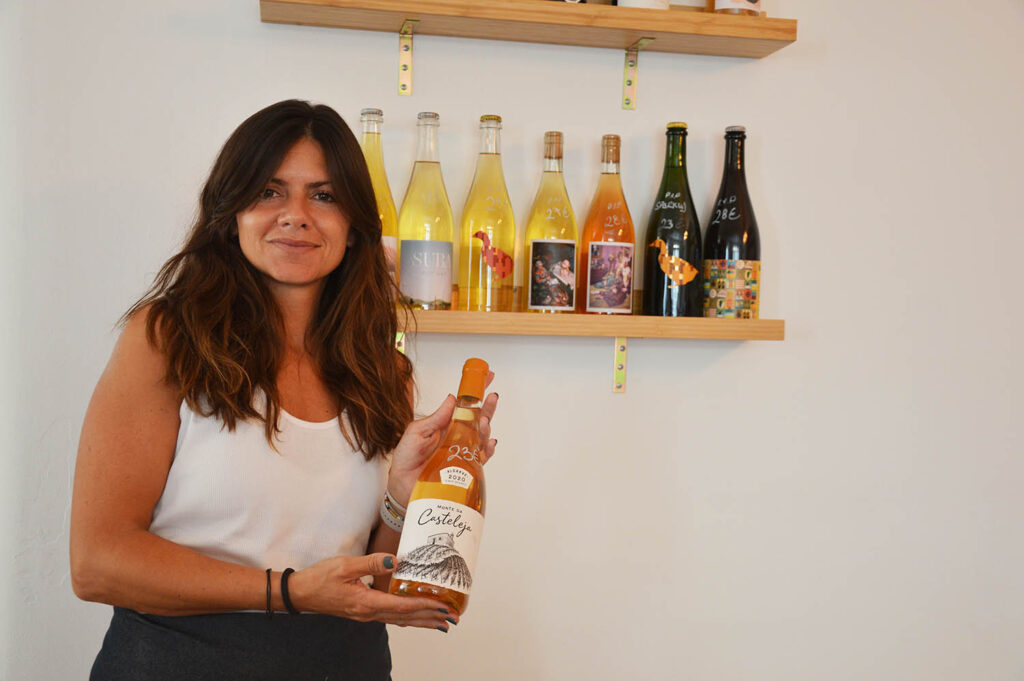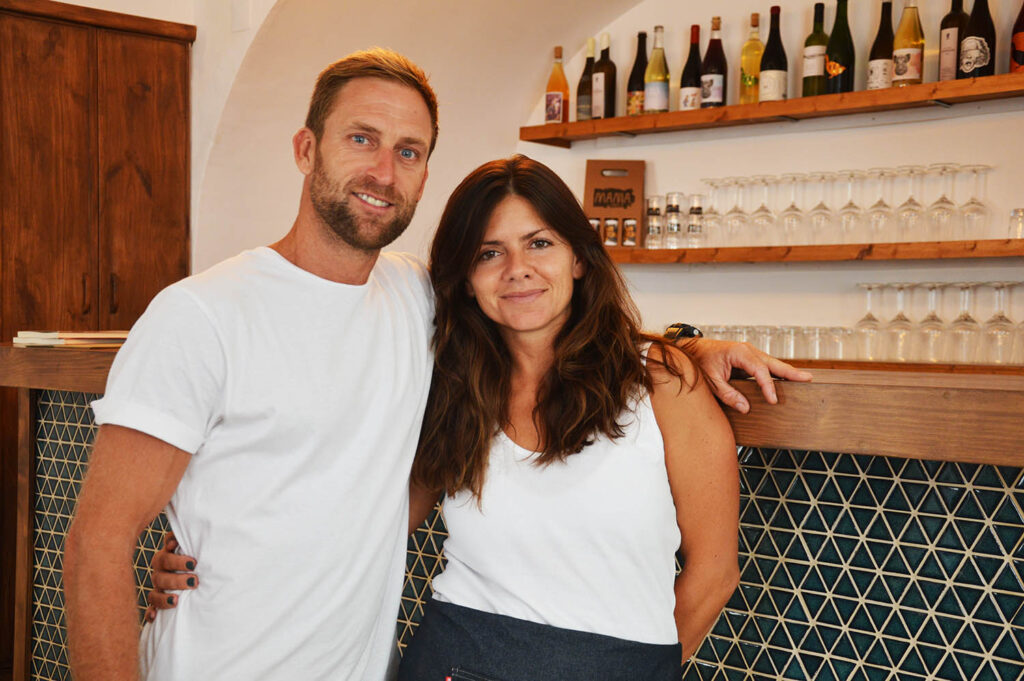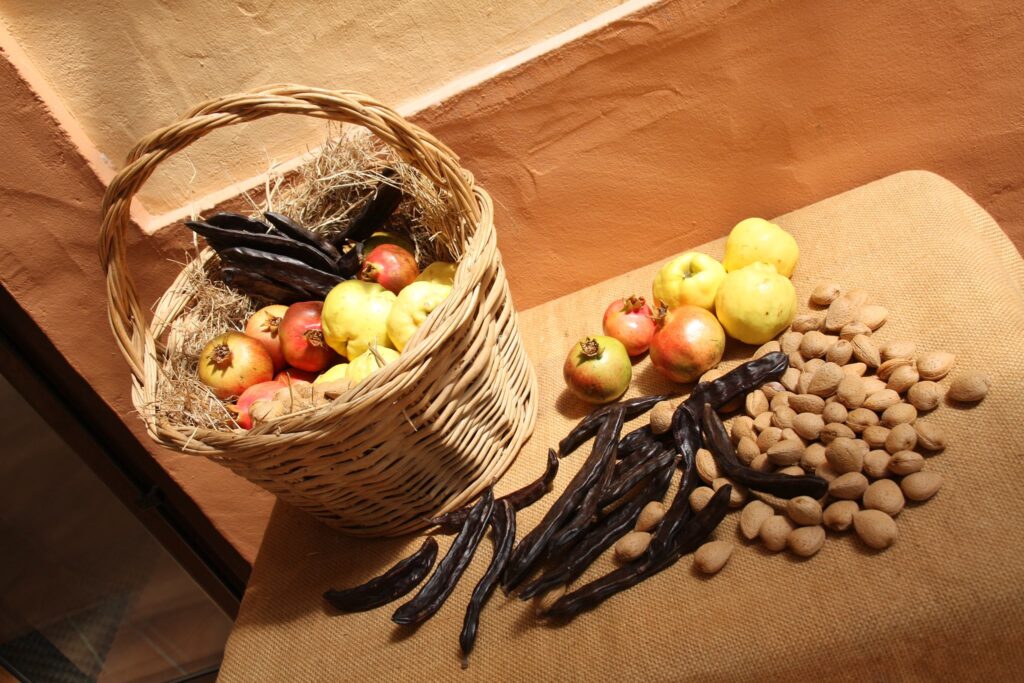Travia is a word used in the Algarve and Alentejo that means «the food that was given to the pigs, the poorly cooked food, the leftovers that went to the pigs». At first glance, knowing the meaning of the word, it doesn't seem like a great choice for the name of a restaurant. But after getting to know the restaurant in question and, above all, the philosophy behind the project, it all makes sense. It is a provocation, an affirmation, a challenge, like much of what Maria Loureiro de Lemos, its promoter, likes to do in life.
«Travia», which the two promoters, Maria and her boyfriend Lee Moulton, a Welshman who has lived in the Algarve for several years, opened about two weeks ago on the corner of a street in the center of Lagos, «is not a restaurant , it's not a bar… We have tapas, we have wine… This is a personal challenge above all».
Maria, in an interview with Sul Informação, recalls his past lives, to explain how he got here: «I lived in the United States and had a life corporate, was vice president of marketing for an American company in Boston. Then, one day, I decided to leave this job corporate and I returned to Portugal, where I started to my gastronomic tourism company».
The businesswoman was later linked to the Petisco Route, promoted by the Teia d'Impulsos association, which is headquartered in Portimão. In fact, the «Travia», even a newborn, participates in this year's edition of the Route, which is already underway. She was also the organizer of the Lakes Food Fest, suspended because of the pandemic.
During the pandemic, tourism died and Maria Loureiro de Lemos had to devote herself to another area, linked to her interests. «I've been working a lot with the Creative Territories, coordinating tourism programs at national level, namely in the area of sustainability. I coordinated Green Up at a national level, I worked with Alvaiázere, with Coruche, I'm also working with endogenous products». For all that, he began «to think a lot about sustainability linked to my area, which is gastronomy, in Lagos».
With a laugh, Maria adds: “What I like is eating and drinking and I've already said “I'll have a tasco one day”. I didn't know it was going to be this day and in this place».
The space where the «Travia» is located (on the corner of Rua Marreiros Neto and Cândido dos Reis), in the heart of Lagos, had already functioned as a restaurant, «but one of those aimed at tourists». With the pandemic, the owner, a foreign national, sold the entire building. Maria and Lee know the current owner and that's how they came up with the idea of opening the new business. In times of pandemic, with tourism still timidly recovering, it was a risk…but nothing to frighten the entrepreneur.
«About a month and a half ago, this was all a little running, I saw this space for rent and I thought the location was great. And that's how Travia appeared». That it is not (just) a restaurant, it is not (just) a tapas house. It is, for starters, a place where what you eat and drink is of local or regional origin. And it's from the time. Hence, the menu changes every three or four days, depending on what local suppliers or the market have to offer.
“I want to combat this notion that restaurants always have the same dishes, that Recheio is the solution, that this part of industrialization, consistency of supply, is demanded by customers and restaurants. On the contrary, we created here a business model that, logistically, is super complicated, but where we effectively only work with local producers».

For vegetables and fruits, the main suppliers are the farms of the Mud Valley and the one of six maries, biological producers, both located in the municipality of Lagos. Fish and other vegetables and fruits are bought at the local market, namely the one from the land reform, where small farmers in the area sell. The fresh goat cheese is from a producer in Sagres, from Grandmother Deolinda's Cheese Shop. the oysters come from OysterSelect, from the Ria de Alvor. The only beer is the Mania, handcrafted, produced in Lagos.
The only exception to these local producers are wines. «But we only have national and only organic wines», which have «a story behind them». Therefore, on the shelves of «Travia» there are unusual wine proposals, some of them from the region. «From the Algarve, we have the Mount of Casteleja and the Morgado do Quintao which, despite not being certified yet, is already organic».
Focusing on sustainability and the true circular economy takes work, a lot of work. It is necessary to go to the market frequently, to make contacts with the producers-suppliers almost every day, so that the menus will reflect the passing of the days, the seasons, building on “what's there”.
These details make all the difference at «Travia», because here the customer has the advantage of eating different things, even if he goes back there many times.
«Initially, I was a little afraid, because, imagine, today my goat cheese supplier didn't have goat cheese. It happened to us last week that we didn't have muxamas and I was scared to death, talking to clients, saying “look, we don't have muxamas today”. And the reaction of the customers, instead of being “oh how boring”, was “oh how good”. Because they understand the concept. The idea is not to always have everything available. If there isn't, there isn't, there's no problem. We do not want to be the restaurant that is known for having the best muxama in the Algarve, we want to be a place where people know that, when they come here, they will eat well, healthy, local and will be supporting the ecosystem».
on the day the Sul Informação he visited the “Travia”, the menu had dishes such as “tomato, plum and purslane”, “pumpkin and beetroot salad”, “fish tartar”, made with croaker, “Assadura de Monchique”, “new potato, sour cream, walnuts and anchovy”.
Local products are more expensive, but this is not prohibitively reflected in the prices charged at the restaurant. Maria Loureiro de Lemos emphasizes that it is about respecting the philosophy, the concept of “Travia”, which means “having a positive impact on society. I pay three times more for tomatoes than I would pay for Recheio. My beer is five times more expensive than a Sagres». But it has to be that way!
«I don't want to get rich, I want to reach the end of the month and have my money so that we are at ease. And I want whoever is around us to be okay too. I don't mind paying 4 euros a kilo for tomatoes. Because I know the tomato will be good. I know that D.Deolinda has a grandson and the grandson will be able to buy the pair of skates he wants, because she sells her production at fair prices. These are silly things, but for me they have some purpose. We talk a lot about impact and then it's these little things that end up changing people's lives», he adds.
As already seen from the examples on the menu mentioned above, at “Travia” you can eat everything.
“When I say it's a sustainable restaurant, my friends say 'so it's vegetarian' or 'so it's vegan' and I say no. I believe in moderation and I like eating meat and eating fish. I think that we, nowadays, are very extreme at all points…But we can be environmentally friendly and live a sustainable life and eat well, eat fish and meat, drink wine…», explains Maria.
What he wants is "to try to make people understand that there is a middle ground, as long as things are done in moderation". That's why “the menu changes every three or four days, because I'm not expecting to have extraordinary amounts of pumpkin for weeks on end first. Second, because I don't want to buy the whole pumpkin from my supplier, because there are other people who also want to eat pumpkin in Lagos. With moderation, we managed to change the world, little by little», he defends.
The recipes, as you can see, start from the traditional, but adding some creativity. “It has to be that way, because we don't know how things were done in the past. This immaterial culture, of taking the pumpkin, in its time, and doing something else, using the seeds for something else… We don't know how to do that anymore, because we are used to going to the supermarket. We are relearning to live only at the local level».
The restaurant's kitchen is in charge of the young chef Rafael Jesus, chosen after Maria interviewed countless cooks, with a lot of experience and technically very good, but who were not willing to do this. adventure to change the menu every three days.
“Finding people who were on the same wave was complicated. Rafael has no experience as a chef, he is the only one in charge, but when I told him I wanted to work on the product, he replied: “Oh my grandmother has a farm and the onions…”. He had that passion and I told him: “look Rafael, you know what? you don't have experience alone in the kitchen, relax, we're all learning, bora do"". Another challenge, another risk that, so far, has gone very well.
Proving that the objective of «Travia» is, in fact, to contribute to the common good, Maria says that a few days ago a customer said: «this cheese is wonderful». And the businesswoman replied: «This cheese is made by Roberto, in Sagres. These are the cheeses of Grandmother Deolinda. And, if you like, we can arrange, in two days, a visit to the cheeses, you can milk the goats, make cheese. This gives people an opportunity to realize that the food goes far beyond what is on the plate. Able to understand who Roberto is, who the goats are, and give more value to what they are eating. I venture to say that 50% of the clients I had here booked wine tastings in Monte da Casteleja. And vice versa". It is the circular economy that is so often talked about, working, in practice.
Currently, due to its location in the center of Lagos, around 70% of «Travia» customers are foreigners. But Maria wants the Portuguese, the Lacobrigenses, the Algarvians to also get to know her space and appreciate how much it has to offer.
«The Portuguese who have been coming are people from here, people who live in Lagos. We haven't done any advertising yet, nor the Mr Google know we exist. Therefore, those who end up coming more are foreigners who pass through the street. But I am convinced that it will change, for more Portuguese people. And that's my goal, which doesn't mean I don't want tourists, but when you want to work on an ecosystem, you work for whoever is here».
In addition to good food and good drink, «Travia» is a pleasant space (with tables inside and on the terrace), where even the artists are local. On the restaurant wall, there is now a painting of Agnes Barracha, from Portimão, which was designed for space…and in space. It was right there that Inês painted her. «Every three months, we will invite a local or regional artist to come here to make another painting», explains Maria.
And it is the young businesswoman from Lagos who sums up what her “Travia” is: “we serve food and drink, yes. And we work on sustainability. But it goes further. We work in close partnership with local producers - who teach us to work and respect the product - and we also give our customers the opportunity to visit our partners, have a morning to learn regenerative farming, or make goat cheese in Sagres , or a wine tasting at Monte da Casteleja. It is a meeting point, or starting point, to get to know our ecosystem, our culture».
For now, the «Travia» only opens in the afternoon and evening, so it is advisable to contact the restaurant before going there. Prices are affordable, around 6 to 8,50 euros per dish. Craft beer costs 2,20 euros, wines range from 21 to 55 euros, but there is wine by the glass.
You can follow Travia on Instagram at @travia_wineandfood
Note: The phrase used in the title is taken from the «Travia» menu. And it sums it up.





















Comments